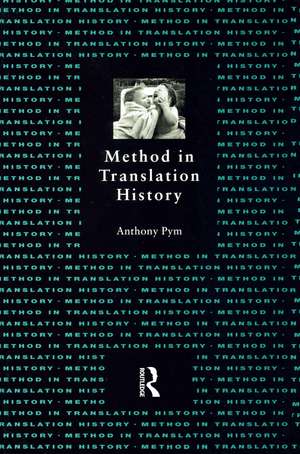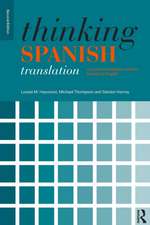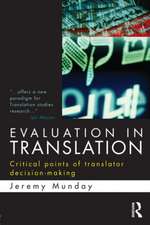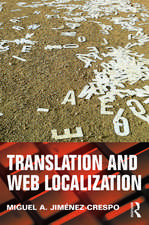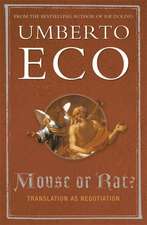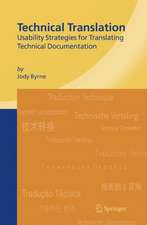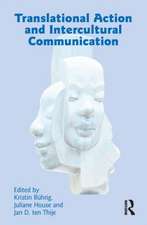Method in Translation History
Autor Anthony Pymen Limba Engleză Hardback – feb 2016
At the same time, the proposed methodology is eminently constructive, showing how many empirical techniques can be developed and applied: clear illustrations are given of corpus selection, working definitions, deceptive statistics, and the construction of networks and regimes, incorporating elaborate examples drawn from medieval and modernist fields, as well as finding space for notes on practical problems like funding research. Finding its focus in historical debates, this book cannot help but create contemporary debate: its arguments seek not only to revitalize the historical study of translation but also to develop the wider concerns of intercultural studies.
| Toate formatele și edițiile | Preț | Express |
|---|---|---|
| Paperback (1) | 370.46 lei 6-8 săpt. | |
| Taylor & Francis – 1998 | 370.46 lei 6-8 săpt. | |
| Hardback (1) | 1001.07 lei 6-8 săpt. | |
| Taylor & Francis – feb 2016 | 1001.07 lei 6-8 săpt. |
Preț: 1001.07 lei
Preț vechi: 1220.81 lei
-18% Nou
Puncte Express: 1502
Preț estimativ în valută:
191.55€ • 199.100$ • 158.54£
191.55€ • 199.100$ • 158.54£
Carte tipărită la comandă
Livrare economică 04-18 aprilie
Preluare comenzi: 021 569.72.76
Specificații
ISBN-13: 9781138169616
ISBN-10: 1138169617
Pagini: 234
Dimensiuni: 156 x 234 x 14 mm
Greutate: 0.48 kg
Ediția:1
Editura: Taylor & Francis
Colecția Routledge
Locul publicării:Oxford, United Kingdom
ISBN-10: 1138169617
Pagini: 234
Dimensiuni: 156 x 234 x 14 mm
Greutate: 0.48 kg
Ediția:1
Editura: Taylor & Francis
Colecția Routledge
Locul publicării:Oxford, United Kingdom
Public țintă
PostgraduateCuprins
Method in Translation History: Contents
Preface
Acknowledgements
1. History
History within translation studies
The parts of translation history
The interdependence and separateness of the parts
A too-brief history of translation history
Reasons for doing translation history
2. Importance
What is importance?
5Against blithe empiricism
Personal interests
Research and client interests
Subjective interests and humility
3. Lists
Reasons for lists
Getting data
The difference between catalogues and corpora
Shortcomings in bibliographies: four examples
Completeness in history and geology
Sources as shifting sands
The historian as reader of indexes
4. Working definitions
Why some information has to be thrown out
In defence of definitions
Inclusive definitions
Defining translations from paratexts
Corpora of limit cases
How Wagner sneaked in
How Salomé danced out
5. Frequencies
Statistics and importance
Diachronic distribution
Retranslations, reeditions and non-translations
Retranslation and its reasons
A general diachronic hypothesis
6. Networks
Reconstructing networks from within
Mapping networks
Two cheap transfer maps
Lines and symbols
The spatial axis
Cities as borders
7. Norms and systems
Actually reading translations
Norms?
Systems?
Leaps of faith
The will to system
Subjectless prose
Where's the gold?
8. Regimes
What are regimes?
Starting from debates
A regime for twelfth-century Toledo
A regime for Castilian protohumanism
A regime for early twentieth-century poetry anthologies
Translation as a transaction cost
9. Causes
Systemic and probabilistic causation
Aristotle
Transfer as material causation
Final causes in theories of systems and actions
Equivalence as formal cause
Translators as efficient cause
Multiple causation
10. Translators
Translators, not 'the translator'
Translators can do more than translate
Translators have personal interests
Translators can move
Translators can go by several names
11. Intercultures
Where intercultures are hidden
Translations or translators?
Strangers and trust
Interculturality and its negation
Intercultural professions as a social context
An alternative basic link
What is a culture?
12. Interdisciplinarity
Personal reasons for pessimism
A lacking discipline
Cultural Studies
Intercultural Studies
References
Index
Preface
Acknowledgements
1. History
History within translation studies
The parts of translation history
The interdependence and separateness of the parts
A too-brief history of translation history
Reasons for doing translation history
2. Importance
What is importance?
5Against blithe empiricism
Personal interests
Research and client interests
Subjective interests and humility
3. Lists
Reasons for lists
Getting data
The difference between catalogues and corpora
Shortcomings in bibliographies: four examples
Completeness in history and geology
Sources as shifting sands
The historian as reader of indexes
4. Working definitions
Why some information has to be thrown out
In defence of definitions
Inclusive definitions
Defining translations from paratexts
Corpora of limit cases
How Wagner sneaked in
How Salomé danced out
5. Frequencies
Statistics and importance
Diachronic distribution
Retranslations, reeditions and non-translations
Retranslation and its reasons
A general diachronic hypothesis
6. Networks
Reconstructing networks from within
Mapping networks
Two cheap transfer maps
Lines and symbols
The spatial axis
Cities as borders
7. Norms and systems
Actually reading translations
Norms?
Systems?
Leaps of faith
The will to system
Subjectless prose
Where's the gold?
8. Regimes
What are regimes?
Starting from debates
A regime for twelfth-century Toledo
A regime for Castilian protohumanism
A regime for early twentieth-century poetry anthologies
Translation as a transaction cost
9. Causes
Systemic and probabilistic causation
Aristotle
Transfer as material causation
Final causes in theories of systems and actions
Equivalence as formal cause
Translators as efficient cause
Multiple causation
10. Translators
Translators, not 'the translator'
Translators can do more than translate
Translators have personal interests
Translators can move
Translators can go by several names
11. Intercultures
Where intercultures are hidden
Translations or translators?
Strangers and trust
Interculturality and its negation
Intercultural professions as a social context
An alternative basic link
What is a culture?
12. Interdisciplinarity
Personal reasons for pessimism
A lacking discipline
Cultural Studies
Intercultural Studies
References
Index
Recenzii
... a provocative and intelligent book which represents a model of excellent scholarship. (Edoardo Crisafulli, Perspectives)
... an invaluable contribution to the discipline, long overdue (Zuzan Jettmarova, Across Languages and Cultures)
... asks many fundamental questions about the present state and future direction of translation theory in addition to being an excellent primmer for research students in translation history. (Michael Cronin, Target)
... an invaluable contribution to the discipline, long overdue (Zuzan Jettmarova, Across Languages and Cultures)
... asks many fundamental questions about the present state and future direction of translation theory in addition to being an excellent primmer for research students in translation history. (Michael Cronin, Target)
Descriere
Finding its focus in historical debates, this book cannot help but create contemporary debate: its arguments seek not only to revitalize the historical study of translation but also to develop the wider concerns of intercultural studies
